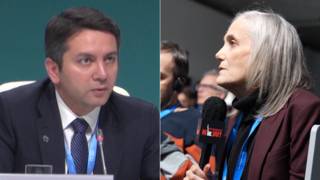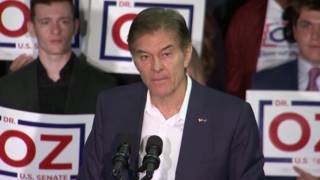HeadlinesFebruary 04, 2010
Haiti Confirms Toll of Over 200,000
The Haitian government has now confirmed an earthquake death toll of over 200,000. Another 300,000 have been treated for injuries. The number of destroyed homes stands at 250,000, while some 30,000 businesses have been lost.
Protests over a lack of aid continued Wednesday with a march on the mayor’s office in the neighborhood of Pétionville. Another 200 people rallied near the US embassy, calling for food and water. Meanwhile in the neighborhood of Cité Soleil, one resident said scores of people are still forced to sleep outside with no shelter.
Resident: “Rescue us! Rescue us! Those governments that want to give us help, please hurry. We don’t have homes or food. We don’t have anything. We are living in the plaza of Cité Soleil.”
Clinton to Coordinate Haiti Relief for UN
The UN, meanwhile, has appointed former President Bill Clinton to coordinate international relief efforts in Haiti. As president, Clinton helped restore then-Haitian President Jean-Bertrand Aristide after the first US-backed coup against Aristide. But Clinton was criticized for forcing Aristide to adopt neoliberal policies as a condition of his return. Since leaving the White House, Clinton has supported groups providing medical care to the Haitian poor, including Partners in Health.
Soldier Killings Highlight US Military Role in Pakistan
US operations in Pakistan are under increased scrutiny today following Wednesday’s killing of three US soldiers in a roadside attack. The soldiers were traveling as part of a Pakistani military convoy and were reportedly wearing disguises. Another two US soldiers were wounded in the bombing. As recently as July, the Obama administration’s special envoy, Richard Holbrooke, denied a US military presence in Pakistan, saying, “People think that the US has troops in Pakistan. Well, we don’t.” But after Wednesday’s bombing, Holbrooke said, “There’s nothing secret about their presence.”
NATO, Afghan Forces Prepare War’s Largest Joint Offensive
In Afghanistan, the NATO occupation force and the Afghan military are preparing their biggest joint offensive of the over eight-year war. The attack is expected to target the Taliban-controlled town of Marjah. The US hasn’t given a time frame, but Marjah residents have been given leaflets warning them to be prepared to flee. Meanwhile, President Obama’s escalation of the Afghan war is in high gear. Testifying before Congress, the chair of the Joint Chiefs of Staff, Admiral Mike Mullen, said US troops in Afghanistan will soon outnumber those in Iraq for the first time.
Admiral Mike Mullen: “We have already moved nearly 4,500 troops to Afghanistan and expect that about 18,000 of the President’s December 1st commitment will be there by late spring. The remainder of the 30,000 will arrive as rapidly as possible over the summer and early fall, making a major contribution to reversing the Taliban momentum in 2010. Indeed, by the middle of this year, Afghanistan will surpass Iraq, for the first time since 2003, as the location with the most deployed American forces.”
Iraqi Appeals Court Overturns Candidate Bans
In Iraq, an appeals court has overturned a ruling banning hundreds of political candidates for having ties to Saddam Hussein’s Baath Party. The ban had led to calls for a boycott of next month’s Iraqi elections. More than 500 candidates would have been prevented from running, most of them members of Iraqi Prime Minister Nouri Kamal al-Maliki’s rival coalition.
Powell Backs Repeal of Don’t Ask, Don’t Tell
Retired Army General and former Secretary of State Colin Powell has reversed his longstanding opposition to allowing gay men and lesbians from serving openly in the military. Powell was one of the key figures behind the establishment of “don’t ask, don’t tell” seventeen years ago. But on Wednesday, Powell said he backed calls from the Pentagon’s top leaders to drop the ban, saying, “Attitudes and circumstances have changed.” Defense Secretary Robert Gates, meanwhile, returned to Congress for a second day of testimony, saying a repeal would first be subject to an extensive review.
Defense Secretary Robert Gates: “The role of a leader, it seems to me, is to set the goal, but if you want lasting and effective change, you had better bring the people who are going to be affected by it into the discussion and get their views. And at a minimum, it will help you mitigate whatever negative consequences there are. That’s the purpose of this review.”
Toyota Admits New Flaws Amidst Mass Recall
The auto giant Toyota is reeling from a global recall of some 4.5 million vehicles since last month, more than half in the United States. Toyota has acknowledged mechanical problems with its gas pedals, which have been in found in some cases to remain stuck to the floor when pressed down. On Wednesday, Transportation Secretary Ray LaHood startled Toyota owners in urging them to stop driving the recalled vehicles.
Transportation Secretary Ray LaHood: “If anybody owns one of these vehicles, stop driving it. Take it to a Toyota dealer, because they believe they have the fix for it.”
Lahood later retracted his comments, saying Toyota owners should seek repairs if they have concerns about their vehicle. Toyota’s woes continued early today with the admission it’s found design problems with the brake pedal in its hybrid Prius model. Toyota says its fixed the flaw in Prius models sold since late last month, but hasn’t addressed a solution for those sold before. The Washington Post meanwhile reports a 2007 federal probe unearthed acceleration problems in Toyota models, but applied its conclusions to only a small percentage of Toyota’s vehicles.
House Bill Would Repeal Health Industry Antitrust Exemptions
Democratic Congress members Tom Perriello and Betsy Markey have announced plans to introduce a measure this week to repeal the insurance industry’s exemption from federal antitrust laws. Critics say the McCarran-Ferguson Act of 1945 has granted the insurance industry a captive market with no curbs on price fixing and other anti-competitive practices. A similar measure passed in a House committee vote last year but has stalled with the breakdown of talks on healthcare reform.
EPA Guidelines Could Boost Ethanol Production
And the Obama administration has issued new guidelines that could pave the way for a major increase in production of biofuels including corn-based ethanol. On Wednesday, the Environmental Protection Agency said ethanol could help curb emissions by replacing conventional fuels. The finding reverses an earlier EPA stance that called for limiting ethanol use, because its direct and indirect greenhouse emissions exceed renewable energy standards. Ethanol has also been criticized for diverting food crops to produce fuel. In a statement, Friends of the Earth said, “The EPA [has] acknowledged…corn ethanol production is driving the destruction of natural areas around the world, which in turn leads to biodiversity loss and immense carbon emissions. The EPA’s greenhouse gas emissions model should be greeted with skepticism.”
Most popular
- 1
- 2
- 3
- 4
Non-commercial news needs your support
Please do your part today.











Media Options